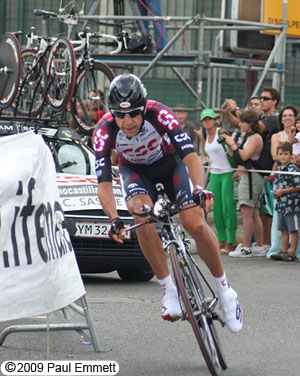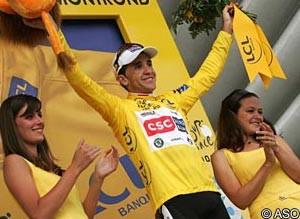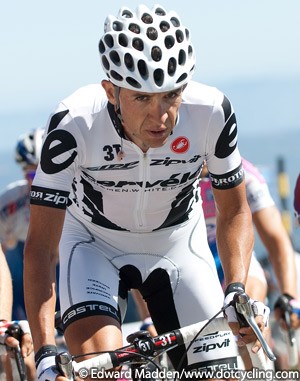Victory in 2008 Tour de France marked high point for climber
 The 2008 Tour de France winner Carlos Sastre has announced that he is to end his professional career, deciding to leave the sport rather than continuing on into 2012.
The 2008 Tour de France winner Carlos Sastre has announced that he is to end his professional career, deciding to leave the sport rather than continuing on into 2012.
The 36 year old Spaniard competed with the Geox TMC team this season but had a quieter year than expected. He started the recent Vuelta a España as joint team leader with Denis Menchov, but both riders were eclipsed by their team-mate Juan Jose Cobo, whom they ended up supporting.
He won the race by 13 seconds ahead of Chris Froome (Sky Procycling).
Sastre had a one year deal with Geox TMC, which indicated to him that it would not be extending it. The team’s future is uncertain and so this may have been a factor. He said recently that he had other offers but wanted to consult his family and weigh up everything before deciding what to do.
Sastre held a press conference today at the Los 5 Pinos hotel in Madrid, and there confirmed that he had decided to stop.
“The moment has arrived to end this phase,” he said. “Having with me the winner of the Vuelta and winning the team title was the best climax to my career. Next year I will begin a new stage, although I don’t yet know what I will do.
Sastre’s final Vuelta a España had a hint of a farewell about it, with a lone attack in the finale of stage 20 to Vitoria appearing to be an adios of sorts to his fans. He caught Carlos Barredo (Rabobank) with 15 kilometres to go, pushed on ahead afterwards and was ultimately caught three kilometres from the finish line.
Speaking after the end of the Vuelta, he spoke nostalgically about his career, thus giving a further indication of where he was heading.
“At the end of the race I felt good, I enjoyed it and I’m happy to arrive in Madrid and to have completed my tenth Vuelta a España,” he said. “In these moments, I look back and I can see all these Grand Tours; I think I raced 26 in total and I could complete 25. The truth is there are many memories.
“Today, in the first part of stage, I had the opportunity to comment this with my companions, and the truth is that there are many memories which come to my mind these days. For them, for me and for everyone. It’s always nice to remember.”
Big career with quiet ending:
Sastre’s relatively modest performances in the past two seasons have to some extent blurred over what was a very fine career, with several standout performances. He turned pro in 1998 with the ONCE team and competed as part of that setup before moving to CSC Tiscali in 2002.
During that first four years, he worked chiefly for other riders, but also gave an indication of what lay ahead. At 25 years of age he won the mountains classification and finished eighth overall in the 2000 Vuelta, then the following year he won a stage of the Vuelta a Burgos.
Moving to Bjarne Riis’ CSC team gave him more opportunities and he finished tenth in the 2002 Tour de France. Two things became apparent over the next few years; firstly, that he was a rider who maintained a high level throughout three week races, often becoming stronger as the days ticked by, and also that he was steadily developing into a bona-fide Grand Tour contender.
 Fifth and eighth in the 2004 Vuelta a España and Tour de France, he returned to the Vuelta the following season and placed second behind Denis Menchov. He had originally finished third on the podium but was elevated when the winner Roberto Heras was disqualified for a positive drugs test.
Fifth and eighth in the 2004 Vuelta a España and Tour de France, he returned to the Vuelta the following season and placed second behind Denis Menchov. He had originally finished third on the podium but was elevated when the winner Roberto Heras was disqualified for a positive drugs test.
Sastre took on a big undertaking in 2006, riding all three Grand Tours for the first time. He supported CSC team-mate Ivan Basso in the Giro d’Italia, helping the Italian win the race. Then after Basso was blocked from riding the Tour, he proved himself to be one of the strongest climbers in the French event.
Sastre won the 182 kilometre mountain stage to La Toussuire, best known as the day Floyd Landis cracked, and finished third overall after the American’s disqualification from the top spot.
His third Grand Tour of the season was also a good one, with the Spaniard wearing the gold jersey after CSC’s team time trial stage win, and taking fourth overall.
Building towards Tour de France success:
As the years passed, Sastre was becoming more and more a regular sight at the front of the bunch in the mountain stages. His progression continued when he was runner up to Menchov in the 2007 Vuelta a España, a few weeks after finishing a solid fourth overall in the Tour de France.
 That consistency meant that he went into the 2008 Tour as a joint team leader with CSC companions Andy and Frank Schleck. The latter wore yellow heading into the final phase of the race, but Sastre was close by and was part of the team’s plans to play several hands and secure the overall win. He put in a strong attack at the base of Alpe d’Huez, cracking Menchov who had initially covered his surge, and soloed to victory at the top of the legendary mountain.
That consistency meant that he went into the 2008 Tour as a joint team leader with CSC companions Andy and Frank Schleck. The latter wore yellow heading into the final phase of the race, but Sastre was close by and was part of the team’s plans to play several hands and secure the overall win. He put in a strong attack at the base of Alpe d’Huez, cracking Menchov who had initially covered his surge, and soloed to victory at the top of the legendary mountain.
Crucially, he gained time while the other contenders marked Frank Schleck, and moved into the race lead. However he held only a one minute 34 second advantage over Cadel Evans (Silence-Lotto) heading into the final time trial and many expected the Australian to overcome that deficit over the 53 kilometres. It was not to be, though, with a fatigued, pressurized Evans recouping just 29 seconds over a solid Sastre and finishing second overall.
That ensured that the Spaniard rode into Paris as the winner of the Tour, reaching what would be the high point of his career.
New projects:
With the Schleck brothers appearing to be destined to play a big part in cycling’s future, the elder Sastre knew that there would be limited opportunities with Saxo Bank from that point on. Shortly before finishing third in the Vuelta, he took the decision to jump ship and moved to the new Cervélo Test Team in 2009.
 He was one of the two top names in the squad, Thor Hushovd being the other, and together with team mangement they helped secure an invite to the 2009 Tour de France. Prior to that, Sastre competed in the Giro d’Italia and clocked up what would turn out to be his last really big performance in a Grand Tour; stage wins at Monte Petrano and Mount Vesuvius, plus third overall.
He was one of the two top names in the squad, Thor Hushovd being the other, and together with team mangement they helped secure an invite to the 2009 Tour de France. Prior to that, Sastre competed in the Giro d’Italia and clocked up what would turn out to be his last really big performance in a Grand Tour; stage wins at Monte Petrano and Mount Vesuvius, plus third overall.
His career didn’t reach the same heights after that point; he was off the pace in the Tour, netting sixteenth overall, then last year finished eighth in the Giro, twentieth in the Tour and eighth in the Vuelta. Although two top ten finishes were more than respectable, the perception was that his career was starting to wind down and a modest 2011 season furthered that belief.
Still, even though his recent performances did not light up the peloton, it should be remembered that Sastre was one of the most consistent riders of recent seasons. The perception of him as a lucky winner of the Tour de France is an unfair one, given his three previous podium finishes in the Vuelta and Tour.
His past two seasons may have been one characterized by having more misses than hits, but he did enough over a 14 year period to be regarded as one of the top stage race riders of his era.In time that will be remembered far more strongly than the drawn-out finale of his career.